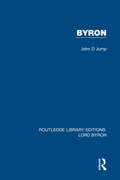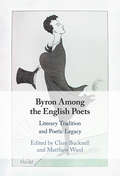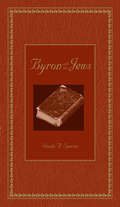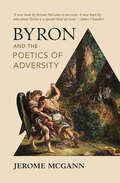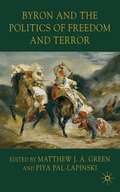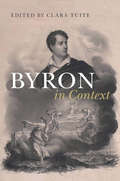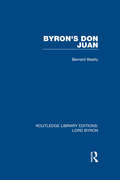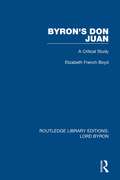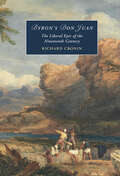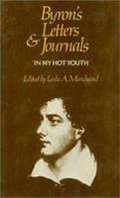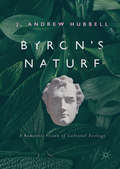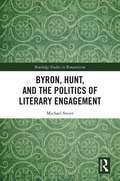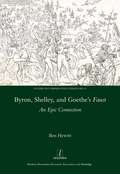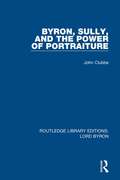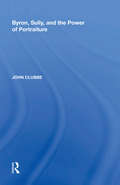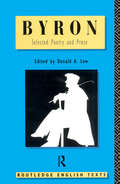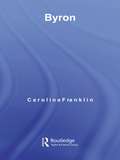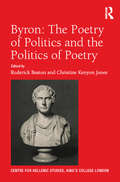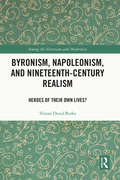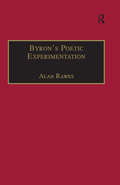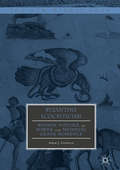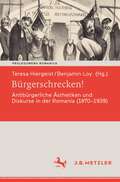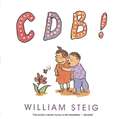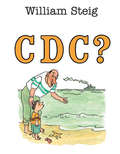- Table View
- List View
Byron (Routledge Library Editions: Lord Byron #4)
by John D. JumpFirst published in 1972. John D. Jump, a leading authority on Byron and the Romantic period, here gives an account of Byron’s literary achievement in relation to the age of revolutions in which he lived and in relation to his own character and personal circumstances. Professor Jump focuses upon the major poems and also discusses Byron’s prose, principally his letters and journals. In doing so he covers all of the important aspects of Byron’s work.
Byron Among the English Poets: Literary Tradition and Poetic Legacy
by Matthew Ward Clare BucknellFor Byron, poetic achievement was always relative. Writing meant dwelling in an echo chamber of other voices that enriched and contextualised what he had to say. He believed that literary traditions mattered and regarded poetic form as something embedded in historical moments and places. His poetry, as this volume demonstrates, engaged richly and experimentally with English influences and in turn licenced experimentation in multiple strands of post-Romantic English verse. In Byron Among the English Poets he is seen as a poet's poet, a writer whose verse has served as both echo of and prompt for a host of other voices. Here, leading international scholars consider both the contours of individual literary relationships and broader questions regarding the workings of intertextuality, exploring the many ways Byron might be thought to be 'among' the poets: alluding and alluded to; collaborative; competitive; parodied; worked and reworked in imitations, critiques, tributes, travesties and biographies.
Byron and the Jews
by Sheila A. SpectorA full-length critical inquiry into the complex interrelationship between the British poet and the Jews.
Byron and the Poetics of Adversity
by Jerome McGannA long line of traditional, often conservative, criticism and cultural commentary deplored Byron as a slipshod poet. This pithy yet aptly poetic book, written by one of the world's foremost Romantic scholars, argues that assessment is badly mistaken. Byron's great subject is what he called 'Cant': the habit of abusing the world through misusing language. Setting up his poetry as a laboratory to investigate failures of writing, reading, and thinking, Byron delivered sharp critical judgment on the costs exacted by a careless approach to his Mother Tongue. Perspicuous readings of Byron alongside some of his Romantic contemporaries – Burns, Blake, Wordsworth, Coleridge, Shelley – reveal Byron's startling reconfiguration of poetry as a 'broken mirror' and shattered lamp. The paradoxical result was to argue that his age's contradictions, and his own, offered both ethical opportunities and a promise of poetic – broadly cultural – emancipation. This book represents a major contribution to ideas about Romanticism.
Byron and the Politics of Freedom and Terror
by Matthew J. A. Green Piya Pal-LapinskiThis interdisciplinary collection explores the divergence or convergence of freedom and terror in a range of Byron's works. Challenging the binary opposition of historicism and critical theory, it combines topical debates in a manner that is sensitive both to the circumstances of their emergence and to their relevance for the twenty-first century.
Byron in Context (Literature in Context)
by Clara TuiteGeorge Gordon, the sixth Lord Byron (1788–1824), was one of the most celebrated poets of the Romantic period, as well as a peer, politician and global celebrity, famed not only for his verse, but for his controversial lifestyle and involvement in the Greek War of Independence. In thirty-seven concise, accessible essays, by leading international scholars, this volume explores the social and intertextual relationships that informed Byron's writing; the geopolitical contexts in which he travelled, lived and worked; the cultural and philosophical movements that influenced changing outlooks on religion, science, modern society and sexuality; the dramatic landscape of war, conflict and upheaval that shaped Napoleonic and post-Napoleonic Europe and Regency Britain; and the diverse cultures of reception that mark the ongoing Byron phenomenon as a living ecology in the twenty-first century. This volume illuminates how we might think of Byron in context, but also as a context in his own right.
Byron's Don Juan (Routledge Library Editions: Lord Byron #1)
by Bernard BeattyFirst published in 1985. What sort of poem is Don Juan, and how does it maintain its momentum through its long and often struggling narrative? These are the questions that Bernard Beatty proposes in this subtle and elegant discussion of Byron’s masterwork. The legend of Don Juan was entrenched in European literature and other arts long before it came under Byron’s hands, yet Byron’s treatment of the story is often almost unrecognisably far from its forebears. Beatty indicates how deeply Byron has assimilated his predecessors in order to produce his own work. The sustained argument of this book raises questions of interest not only to students of Byron but of comedy in general, as well as of the place of religious motifs in apparently secularised modes.
Byron's Don Juan: A Critical Study (Routledge Library Editions: Lord Byron #2)
by Elizabeth French BoydWhen this book was published in 1945, interest in Byron’s poetry and appreciation of his titanic role in Romanticism had been steadily increasing. Of all his vast poetic production, Don Juan, the last and greatest of his major works, offers the highest rewards to the modern reader. It not only stands out among his poems as the best expression of Byron, but it ranks with the great poems of the nineteenth century as representative of the era, and of modern European civilization. This title will be of interest to students of literature.
Byron's Don Juan: The Liberal Epic of the Nineteenth Century (Cambridge Studies in Romanticism)
by Richard CroninIn this first full-length study of Byron's masterpiece in over thirty years, Richard Cronin boldly presents Don Juan as the epic poem of its age. Impressively illuminating the whole literary nineteenth century through a single work, he asks what kind of epic can be said to represent an era more readily defined by newspapers and magazines than by competitors such as Wordsworth's Excursion or Southey's Joan of Arc arose. Delving into questions of form and choice of hero, he also explores the controversies that informed the poem's reception, its contemporary interactions, and its influence on later nineteenth-century literature. Don Juan, he argues, is the epic poem demanded by an age of cant and dissembling, when people's feelings and the world they lived in had become disconnected. In it, he finds a powerful defence of liberal thinking at a time when that kind of thinking was under threat.
Byron's Letters and Journals: The complete and unexpurgated text of all the letters available in manuscript and the full printed version of all others
by Leslie A. Marchand George Gordon ByronFirst volume in Marchand's series of Byron's collected letters and journals.
Byron's Nature: A Romantic Vision of Cultural Ecology
by J. Andrew HubbellThis book is a thorough, eco-critical re-evaluation of Lord Byron (1789-1824), claiming him as one of the most important ecological poets in the British Romantic tradition. Using political ecology, post-humanist theory, new materialism, and ecological science, the book shows that Byron’s major poems—Childe Harold’s Pilgrimage, the metaphysical dramas, and Don Juan—are deeply engaged with developing a cultural ecology that could account for the co-creative synergies in human and natural systems, and ground an emancipatory ecopolitics and ecopoetics scaled to address globalized human threats to socio-environmental thriving in the post-Waterloo era. In counterpointing Byron’s eco-cosmopolitanism to the localist dwelling praxis advocated by Romantic Lake poets, Byron’s Nature seeks to enlarge our understanding of the extraordinary range, depth, and importance of Romanticism’s inquiry into the meaning of nature and our ethical relation to it.
Byron's War
by Roderick BeatonRoderick Beaton re-examines Lord Byron's life and writing through the long trajectory of his relationship with Greece. Beginning with the poet's youthful travels in 1809-1811, 'Byron's War traces his years of fame in London and self-imposed exile in Italy, that culminated in the decision to devote himself to the cause of Greek independence. Then comes Byron's dramatic self-transformation, while in Cephalonia, from Romantic rebel to 'new statesman', subordinating himself for the first time to a defined, political cause, in order to begin laying the foundations, during his 'hundred days' at Missolonghi, for a new kind of polity in Europe - that of the nation-state as we know it today. Byron's War draws extensively on Greek historical sources and other unpublished documents, to tell an individual story that also offers a new understanding of the significance that Greece had for Byron, and of Byron's contribution to the origin of the present-day Greek state.
Byron, Hunt, and the Politics of Literary Engagement (Routledge Studies in Romanticism)
by Michael SteierIn the second decade of the nineteenth century, the British press began a campaign of critical abuse against Leigh Hunt, caricaturing the radical journalist as an upstart "Cockney" author whose literary talents were as disreputable as his politics. Lord Byron, on the other hand, was revered as a peer and a poetical genius who, the conservative press argued, would never befriend and collaborate with a writer like Hunt. Yet Byron did just that. Byron, Hunt, and the Politics of Literary Engagement is the first full-length study of the friendship and literary relationship of two of the most important second-generation Romantic authors. Challenging long-held critical attitudes, this study shows that Byron and Hunt engaged in a creative and meaningful dialogue at each major stage in their careers, from their earliest published volumes of juvenile poetry and verse satire to their most celebrated contributions to Romantic literature: The Story of Rimini and Don Juan. Drawing upon newly recovered letters and unpublished manuscript material, this book illuminates the surprisingly durable and artistically significant friendship of Lord Byron and Leigh Hunt.
Byron, Shelley and Goethe's Faust: An Epic Connection
by Ben HewittThe first part of Goethe's dramatic poem Faust (1808), one of the great works of German literature, grabbed the attention of Byron and Percy Shelley in the 1810s, engaging them in a shared fascination that was to exert an important influence over their writings. In this comparative study, Ben Hewitt explores the links between Faust and Byron's and Shelley's works, connecting Goethe and the two English Romantic poets in terms of their differing, intricately related experiments with epic. In so doing, Hewitt enters the three writers into a literary and philosophical dialogue concerning 'epic' and 'tragic' perspectives on human knowledge and potential - perspectives crucial to the very structure and significance of Goethe's masterpiece - and illuminates hitherto unacknowledged affinities between these key figures in Romantic literature, and between British and German Romanticisms.
Byron, Sully, and the Power of Portraiture (Routledge Library Editions: Lord Byron #3)
by John ClubbeFirst published in 2005. Since the early nineteenth century, Byron, the man and his image, have captured the hearts and minds of untold legions of people of all political and social stripes in Britain, Europe, America, and around the world. This book focuses on the history and cultural significance for Federal America of the only portrait of Byron known to have been painted by a major artist. In private hands from 1826 until this day, Thomas Sulley’s Byron has never before been the subject of scholarly study. Beginning with the discovery of the portrait in 1999 and a 200-year narrative of the portrait’s provenance and its relation to other well-known Byron portraits, the author discusses the work within the broad context of British and American portraiture of the late eighteenth and early nineteenth centuries.
Byron, Sully, and the Power of Portraiture (Routledge Library Editions: Lord Byron Ser. #3)
by John ClubbeSince the early nineteenth century, Byron, the man and his image, have captured the hearts and minds of untold legions of people of all political and social stripes in Britain, Europe, America, and around the world. This book focuses on the history and cultural significance for Federal America of the only portrait of Byron known to have been painted by a major artist. In private hands from 1826 until this day, Thomas Sully's Byron has never before been the subject of scholarly study. Beginning with his discovery of the portrait in 1999 and a 200-year narrative of the portrait's provenance and its relation to other well-known Byron portraits, the author discusses the work within the broad context of British and American portraiture of the late eighteenth and early nineteenth centuries. Receiving most attention are Thomas Lawrence and Sully, his American counterpart. The author gives the fullest account to date of Sully's career and his relation to English influences and to figures prominent in the early-nineteenth-century American imagination, among them, Washington, Fanny Kemble, Lafayette, Joseph Bonaparte, and Nicholas Biddle. Byron is discussed as an icon of the young American Republic whose Jubilee year coincided with Sully's initial work on the poet's portrait. Later chapters offer a close reading of the portrait, arguing that Sully has given a visual interpretation truly worthy of his celebrated, controversial, and famously handsome subject.
Byron: Selected Poetry and Prose
by Lord Byron Donald A. LowDonald Low's collection contains Byron's most subversive, spirited and playful poetry as well as his outspoken prose. With helpful and informative annotation and a full bibliography this is an essential study aid for students.
Byron: The Annual Byron Lecture, University Of Nottingham, 19 March 2001 (Routledge Guides to Literature)
by Caroline FranklinLord Byron (1788-1824) was a poet and satirist, as famous in his time for his love affairs and questionable morals as he was for his poetry. Looking beyond the scandal, Byron leaves us a body of work that proved crucial to the development of English poetry and provides a fascinating counterpoint to other writings of the Romantic period. This guide to Byron’s sometimes daunting, often extraordinary work offers: an accessible introduction to the contexts and many interpretations of Byron’s texts, from publication to the present an introduction to key critical texts and perspectives on Byron’s life and work, situated in a broader critical history cross-references between sections of the guide, in order to suggest links between texts, contexts and criticism suggestions for further reading. Part of the Routledge Guides to Literature series, this volume is essential reading for all those beginning detailed study of Byron and seeking not only a guide to his works but also a way through the wealth of contextual and critical material that surrounds them.
Byron: The Poetry Of Politics And The Politics Of Poetry (Publications of the Centre for Hellenic Studies, King's College London #18)
by Roderick Beaton and Christine Kenyon Jones'It is no great matter, supposing that Italy could be liberated, who or what is sacrificed. It is a grand object - the very poetry of politics. Only think - a free Italy!!! Why, there has been nothing like it since the days of Augustus.' So wrote Lord Byron in his journal, in February 1821, only days before the outbreak of revolution in Greece, where three years later he would die in the service of the revolutionary cause. For a poet whose life and work are interlaced with action of multiple sorts, surprisingly little attention has been devoted to Byron's engagement with issues of politics. This volume brings together the work of eminent Byronists from seven European countries and the USA to re-assess the evidence. What did Byron mean by the 'poetry of politics'? Was he, in any sense, a 'political animal'? Can his final, fateful involvement in Greece be understood as the culmination of earlier, more deeply rooted quests? The first part of the book examines the implications of reading and writing as themselves political acts; the second interrogates the politics inherent or implied in Byron's poems and plays; the third follows the trajectory of his political engagement (or non-engagement), from his abortive early career in the British House of Lords, via the Peninsular War in Spain to his involvement in revolutionary politics abroad.
Byronism, Napoleonism, and Nineteenth-Century Realism: Heroes of Their Own Lives? (Among the Victorians and Modernists)
by Tristan Donal BurkeByronism, Napoleonism and Nineteenth-Century Realism offers a fresh analysis of the nineteenth-century European novel, exploring the cultural images of Byron and Napoleon as they appear in the construction of ‘bourgeois heroism.’ Utilizing a unique pan-European perspective, this volume draws together concepts of heroism with theoretically informed questions of form, particularly the role of the hero-protagonist and development of literary realism. Observing Byron and Napoleon as parallel entities, whose rise and twin fame cast long shadows in the first decades of the nineteenth century, this text exemplifies the force of personality which made them heroes. Even where they were reviled, their commitment to challenging moribund cultural and social values make them touchstones for all those who attempted to understand the nineteenth century’s modernity. Integrating the study of heroism in the nineteenth-century novel with key developments in critical theory, Byronism, Napoleonism and Nineteenth-Century Realism is essential reading for students and scholars of the bourgeois hero, as well as those with a wider interest in nineteenth century literature.
Byron’s Poetic Experimentation: Childe Harold, the Tales and the Quest for Comedy (The Nineteenth Century Series)
by Alan RawesIn this study, the author examines the evolution of Byron's poetry from Childe Harold I and II through to the composition of Beppo. Beginning with a close reading of the sustained poetic experimentation that constitutes Childe Harold I and II, he charts the progress of that experimentation in the Tales where Byron's poetry gets entrenched in a tragic idiom. The author then describes Byron's prolonged struggle to break clear of the imaginative limitations imposed by that tragic idiom and to break into a sustainable comic mode: a struggle that drives Childe Harold III, The Prisoner of Chillon, and The Dream only to culminate in success in Childe Harold IV. It is here, as Rawes demonstrates, that the path forward into the comic mode of Beppo and Don Juan is discovered. Byron's Poetic Experimentation also offers a substantial reconsideration of Byron's shifting attitude towards Wordsworthian idealism and a detailed analysis of the structured eclecticism of Manfred.
Byzantine Ecocriticism: Women, Nature, and Power in the Medieval Greek Romance (The New Middle Ages)
by Adam J. GoldwynByzantine Ecocriticism: Women, Nature, and Power in the Medieval Greek Romance applies literary ecocriticism to the imaginative fiction of the Greek world from the twelfth to fifteenth centuries. Through analyses of hunting, gardening, bride-stealing, and warfare, Byzantine Ecocriticism exposes the attitudes and behaviors that justified human control over women, nature, and animals; the means by which such control was exerted; and the anxieties surrounding its limits. Adam Goldwyn thus demonstrates the ways in which intersectional ecocriticism, feminism, and posthumanism can be applied to medieval texts, and illustrates how the legacies of medieval and Byzantine environmental practice and ideology continue to be relevant to contemporary ecological and environmental concerns.
Bürgerschrecken!: Antibürgerliche Ästhetiken und Diskurse in der Romania (1870-1939) (Prolegomena Romanica. Beiträge zu den romanischen Kulturen und Literaturen)
by Teresa Hiergeist Benjamin LoyDer Band untersucht ästhetische und diskursive Formen, die in der Moderne an die Kritik des Bürgerlichen geknüpft sind. Der Fokus richtet sich auf Beispiele aus Frankreich, Italien und Spanien sowie aus Lateinamerika. Diese kulturvergleichende Perspektive auf Dimensionen von Antibürgerlichkeit eröffnet neue Lesarten eines zentralen Themas der Moderne. Die Bandbreite der Analysen umfasst die ästhetischen Dimensionen von anarchistischen Reformdiskursen und reaktionären Gesellschaftsentwürfen ebenso wie von Modellen einer christlichen Kapitalismuskritik oder der revolutionären Programme der Avantgarden. Vor dem Hintergrund eines Wiedererstarkens antibürgerlicher Formationen in der Gegenwart bietet der Band eine historisch-kritische Diskussion alternativer Sozialimaginationen jenseits der bürgerlichen Gesellschaft.
C D B!
by William SteigLetters and numbers are used to create the sounds of words and simple sentences 4 u 2 figure out with the aid of illustrations.
C D C ?
by William SteigTo figure out William Steig's word puzzles you need merely read the letters, numbers, and symbols aloud. If at first the messages aren't clear, there are clever pictures accompanying each one to give you hints. Some are easy, some are hard, but all are a hilarious treat when the phrases are decoded. Originally published in 1984 with black-and-white drawings, C D C ? is given fresh life in this full-color edition painted by Mr. Steig. Also included is an answer key at the end.
